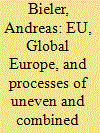| Srl | Item |
| 1 |
ID:
118958


|
|
|
|
|
| Publication |
2013.
|
| Summary/Abstract |
In 2006, the European Union launched its new free trade strategy Global Europe with the explicit goal of increasing European competitiveness. This article explores the positions of trade unions and other social movements on Global Europe. Importantly, while Northern social movements and trade unions from the Global South reject Global Europe due to its impact of deindustrialisation on developing countries, European trade unions support it in so far as it opens up new markets for the export of European manufactured goods. It will be argued that this has to be understood against the background of the dynamics underlying the global economy and here in particular uneven and combined development. Due to the uneven integration of different parts of the world into the global economy, workers in developed countries may actually benefit from free trade, while workers in the Global South are more likely to lose out. It will, however, also be argued that while these different positions within the social relations of production are shaping the position of trade unions, they do not determine them. Over time, through direct engagement, trade unions in the North and South may be able to establish relations of transnational solidarity.
|
|
|
|
|
|
|
|
|
|
|
|
|
|
|
|
| 2 |
ID:
095183


|
|
|
|
|
| Publication |
2010.
|
| Summary/Abstract |
This article examines bi-regional governance between the European Union and Latin American and Caribbean countries as a source of social resistance and contestation. The analysis focuses on the contributions of a bottom-up and informal mechanism of litigation, the Permanent People's Tribunals against European Multinationals and Neoliberalism, to cognitive justice and as a challenge to the notion of neoliberal governance. It questions the underlying assumptions regarding global/regional governance and resistance in the literature on international relations and international political economy, and the type of development and regionalism promoted by EU institutions and governments in Latin America and the Caribbean. The article calls for a problematisation of the resistance that is mobilised through the Tribunals, which is not free of tensions but, nonetheless, contributes through practices of cognitive justice to unveiling the fragmented, and hence, contested, nature of EU neoliberal governance for Latin America and the Caribbean countries.
|
|
|
|
|
|
|
|
|
|
|
|
|
|
|
|